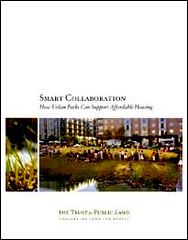New report: how city parks can support affordable housing

Posted May 28, 2009 at 1:35PM
 My friends at the Trust for Public Land have a new report on the relationship between city parks and the big role that we need cities to play in reducing our overall environmental impacts. Parks are especially important to disadvantaged populations.
My friends at the Trust for Public Land have a new report on the relationship between city parks and the big role that we need cities to play in reducing our overall environmental impacts. Parks are especially important to disadvantaged populations.
The report's introduction gets to the heart of the matter:
"It is increasingly apparent that the United States must consider reengineering the form of its fast-growing metropolitan areas, moving away from low-density car dependency and toward a higher-density pedestrian and transit orientation. There is simply not enough land, water, and gasoline to support unending sprawl, and people do not have enough time to devote so many hours to commuting. Moreover, there is a growing awareness that teenagers and senior citizens, in particular, find socialization more difficult in an environment that requires cars for almost every activity . . .
"Nevertheless, most Americans are reluctant to adopt a lifestyle that makes them feel confined and claustrophobic-tall buildings overlooking canyon-like streets, with only an occasional tree breaking up the concrete sterility. In study after study, people say that they want natural greenery where they live for its myriad physical and psychological benefits.
"In the suburbs, that typically means private yards. In the city, it means public parks.
The greater the urban density, the more important is the need for outstanding parks-places to walk, sit, meet friends, play sports, enjoy culture, see floral displays, exercise, watch birds, picnic, paint, make music, play chess, or do the hundreds of other things that parks enable and allow . . .
"For a dense diversity to be achieved-to have "complete communities"-we must design not only for upper-income professionals but also for lower paid service employees, domestic workers, students, retirees, young working families, and others. And to do this, cities need to ensure the provision of housing at varying prices. Transit may make density viable, but affordable housing is what makes it vibrant, and a great park system makes it livable . . ."
The report, Smart Collaboration: How Urban Parks Can Support Affordable Housing, grew out of a colloquium that I had the honor of attending back in the fall of 2007. Written by TPL's Peter Harnik and Ben Welle, it discusses a number of public and private strategies than can be employed to make our cities better places for all to live.